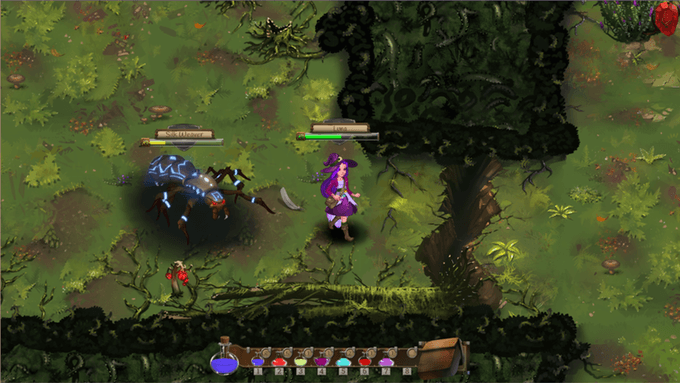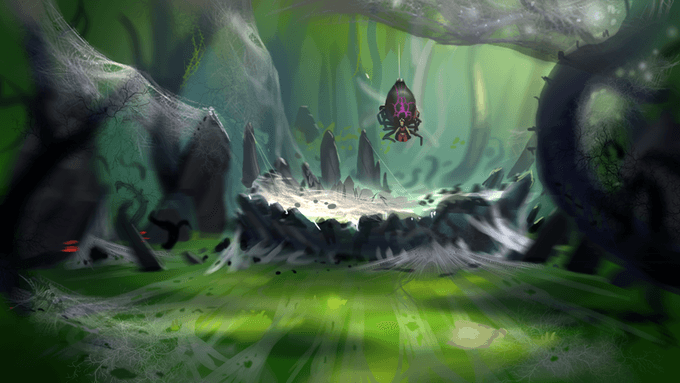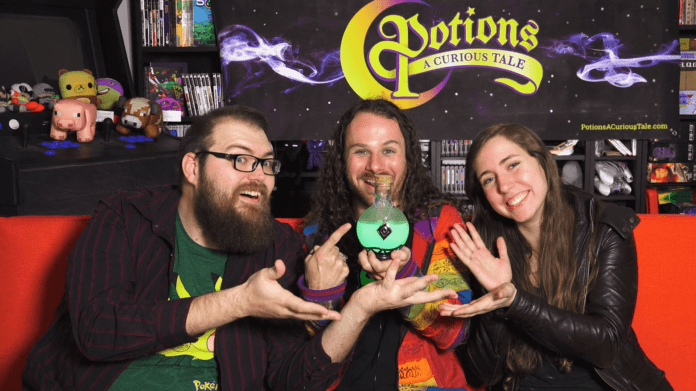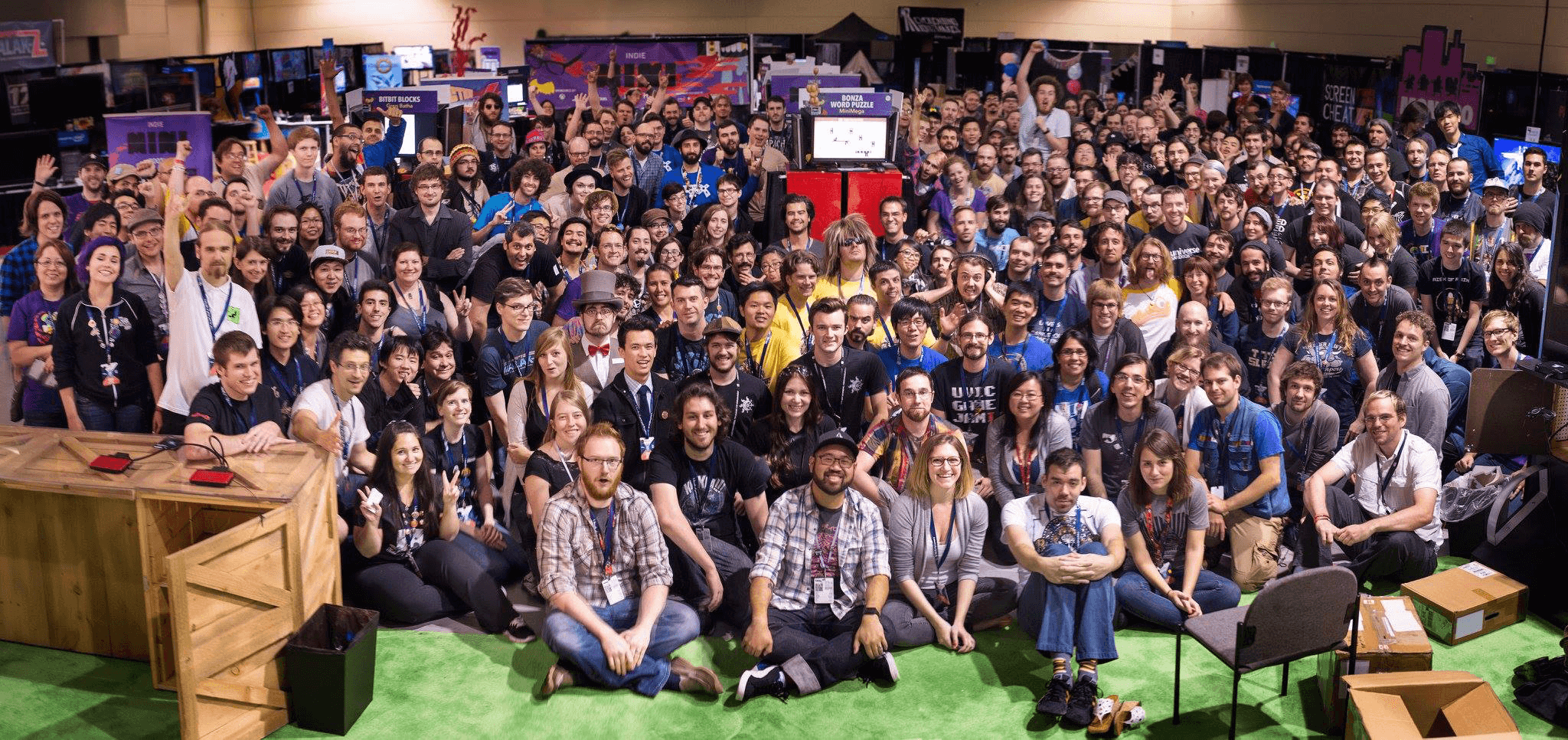The Indie (short for “independent”) game community has exploded over the past decade thanks to advances in technology that have facilitated game development. One great thing about this is it allows anyone with an interest in programming to use the resources available online to become a self-taught programmer. One such example is Renee Gittins, a self-taught game designer who now runs her own independent game studio, named Stumbling Cat.
Gittins and her small team are currently working on a game called Potions: A Curious Tale. A fitting title, considering Gittins has quite the tale to tell about her own journey to becoming a game developer.
[bibblio style=”bib–row-3 bib–hover bib–white-label bib–font-arial bib–default bib–size-16 bib–shine” query_string_params=”eyJ1dG1fc291cmNlIjoiQmliYmxpbyIsInV0bV9tZWRpdW0iOiJNb2R1bGUiLCJ1dG1fY2FtcGFpZ24iOiJSZWNvbW1lbmRhdGlvbnMifQ==” recommendation_type=”optimised”]
A Curious Tale About A Curious Tale
Best of NJ: Tell me a little bit about your background, and how you got to where you are right now.
 Gittins: My name is Renee Gittins, and I’m currently the CEO and Creative Director of a Seattle-based company called Stumbling Cats. Stumbling Cats is a small game studio; we’re kind of based out of Seattle, but we have contributors from all over the world, including one of our environment artists who is actually from London.
Gittins: My name is Renee Gittins, and I’m currently the CEO and Creative Director of a Seattle-based company called Stumbling Cats. Stumbling Cats is a small game studio; we’re kind of based out of Seattle, but we have contributors from all over the world, including one of our environment artists who is actually from London.
I found myself on a rather indirect path to gaming and game development, but I’ve been a gamer, a game player, my entire life. I actually went to college to get a degree in engineering. My focus is engineering and project management. Around my senior year of college, I realized that game development was actually a path I could take. My freshman year of college I was actually introduced to programming for the first time, and I found myself very enamored by programming.
But truthfully I was rather intimidated, because it seemed that everyone who was getting a computer science degree had previously been introduced to programming when they were younger. So I sort of felt like I had missed the train there.
Upon realizing that game design was a path I could take, that was something I started doing in my spare time. I started teaching myself programming; I started drafting out small mini-games. All while my career progressed towards bio-tech, so I actually ended up being a system and design engineer in bio-tech. Then I had progressed so much on the programming side and my company was ramping up our software development team, I actually switched roles and became a software development engineer in bio-tech.
After leaving bio-tech, I decided I really wanted to get into game development. I had experience I had built up half-moonlighting at a small company called Fixer Studios on about a 30-person team, and then I also had experience doing my own small games… So I dove into game development, I started my own company, and I’ve been doing that for about the last year and a half.
Best of NJ: What was your first introduction to video games?
Gittins: My first introduction to games was actually a first-person shooter game; there’s a game called Wolfenstein 3D where you’re basically a military prisoner in a facility run by Nazis. I was so young at the time I truthfully didn’t understand what Nazis were, so that part was lost on me. But my father was very much into first-person shooter games. So I think I had a little unorthodox experience when I first was introduced to games.
But yeah, I played a few first-person shooter games, then I went straight into Pokemon and traditional games that were more commonly played by people of my age.
Best of NJ: You mentioned becoming a self-taught programmer when you got into the game design aspect; As a self-taught programmer, what resources did you use to learn the craft?
Gittins: I think the internet is a huge blessing right now, especially for people who are interested in teaching themselves. There are a number of resources that I use, but for first ramping up with programming, I used a website called Code Academy. I’ve also used Khan Academy, the MIT and Stanford free online courses, and just lots and lots of tutorials and other online resources that are available online. As a programmer, I still heavily use a website called Stack Overflow, which is where I assume most every single programmer who currently is in the business still uses on a regular basis.
Best of NJ: What made you decide to lead your own game studio? Did you plan on becoming a lead developer when you started to learn programming, or were you more interested in simply being part of a team?
Gittins: That’s hard to say. One of the things that has definitely attracted me to video game development is that it is a combination of so many different skills. I’ve always considered myself a Jack – or Jill – of all trades, and what really appealed to me about video game development is I could express my artistic side, and my design side, and my technical side, and my writing side, all together in one medium that’s really engaging.
One of the benefits to starting my own company, or at least being part of a smaller company, is that it allows me to stick my hand in different areas, so I definitely found a larger appeal in a smaller team. I had previously looked at leadership positions, management positions, at larger companies where I wouldn’t have nearly the same amount of reach or creative input, but I do find a great appeal in leading a team. And while I love programming, I think I love helping people perform their best even more, so that’s my biggest draw. That’s why leading a studio has been really engaging and inspiring. I’m really happy with what I’m doing now, and I can’t imagine I’d rather be doing anything else.

Best of NJ: Switching focus towards your game, “Combat is not always the answer” is a phrase that comes up a lot in the marketing material for Potions: A Curious Tale. What makes this aspect of the game so important to you as a developer?
Gittins: As I mentioned, my first few games when I was growing up were very combat based. They were all first-person shooters, so you run around and shoot people; that’s basically the main goal of the game. So I found myself very enamored with fantasy and so I played a lot of role-playing games, both online and offline – I think World of Warcraft is one that people are most familiar with – and gameplay like that rewards you for killing every single fluffy bunny you run across. You’ll either get experience for killing it, or maybe it will drop money, or a few items, but there is a reward – small or large – for killing every single thing you see.
And I was playing a game where there was so much focus… you had to kill so many things to progress onward in the game, that I found myself really frustrated with it. I wanted to progress in the game without having to just run around killing things. So I decided, if I design a game, I want it to be one where your skill and your progression move you forward, and not necessarily just murdering everything you run into. That really developed into this concept of combat not always being the answer, and I really love where that has taken the game, because now every single creature you run into is a puzzle in and of itself. Like, do you need to attack it? Maybe, but maybe you can charm it, or scare it, or trick it to get what you need from the creature.
Best of NJ: Without giving too much away, what can you tell me about the game, as far as plot?
Gittins: The game focuses around a young witch named Luna, and she recently discovered her magical abilities when she was living with her mother. She’s sort of a creative girl, and was combining ingredients in the kitchen, and ended up blowing the back porch off the house. Now this is the first time that something like this had occurred, and her mother realized that Luna had the ability to brew magical potions.
This is something that ran in her family. So [Luna] decides to go apprentice under her grandmother, who lives in the last society on the edge of the wild of the Deep, Dark Forest, where she apprentices to become a potion master.

Best of NJ: Potions is very accessible to a wide audience. As gaming becomes more mainstream, far more emphasis has been placed on making games more inclusive and accessible. Are there any recent games that stick out in your mind as being particularly noteworthy?
Gittins: Inclusive in regards to the people that they depict, or like an age range?
Best of NJ: In terms of character portrayals, or character selections. Say someone is playing a game for the first time and they are looking for a character or story that resonates with them.
Gittins: Right, I think there are a lot of games that are definitely moving that way. Fallout 4 certainly has reached out in that direction. Really, open world games like that from Bethesda [Softworks], such as [The Elder Scrolls V:] Skyrim, do that. In regards to direct character portrayal, the upcoming game from Blizzard, Overwatch, has been praised for having a very diverse set of characters, both in personality and in body types and skin color.
Best of NJ: You’ve written about the idea of fair representation in games before. I think the concept of “fair representation” has different meanings for different people, depending on their perspective. What does fair representation mean to you, in terms of what you hope for when you turn on a game for the first time?
 Gittins: I think fair representation means, when you are depicting people within the game, that everyone has depth to them that is appropriate for their character. I think there are far too many games, and even movies and TV shows, that throw in a token character for the sake of having one who ends up being really shallow, and doesn’t have the same depth or character personality that other characters do.
Gittins: I think fair representation means, when you are depicting people within the game, that everyone has depth to them that is appropriate for their character. I think there are far too many games, and even movies and TV shows, that throw in a token character for the sake of having one who ends up being really shallow, and doesn’t have the same depth or character personality that other characters do.
Now I think fair representation goes a bit beyond that as well in regards to the freedom to play characters that fit your personality, that fit who you visualize yourself as. Obviously, for some games you’re following a specific character and their story; in the case of Potions: A Curious Tale, you’re following Luna’s story. So it makes sense that she is a set character. However, in games like Mass Effect and Fallout and Skyrim, these are games where it is your story which you are making the character for. You have more control over who they are because you also have control more over their actions.
Best of NJ: I wonder how much of that is oversight, versus how balanced the upper management is in terms of diversity?
Gittins: I think one of the ways to ensure these deep interesting characters from all sorts of backgrounds is to have deep interesting people from all sorts of backgrounds on your development team. Certainly, if you have a woman on your design team, it’s more likely that she will design women who she can see herself as and who represents her gender and her identity better than a man would be able to.
Best of NJ: I know you do a lot of advocacy work. What sorts of community events and activities are you a part of?
Gittins: I’m on the Seattle Chapter board of the IGDA, which is the International Game Developers Association. This is an international network that both provides support for game developers and aspiring game developers; they provide resources, scholarships, and events for them to attend. It also works as an advocacy group pushing for better treatment of game developers in the workplace, more diversity, etc.
I also work for an organization called Foundry10, and Foundry10 is an alternative learning organization that hosts a number of programs in order to help inspire and teach students of almost all ages within a lot of fields, from STEM to arts. Actually, Foundry10 has an outreach program in New Jersey with the William Annin Middle School and their visionary teacher Steven Issacs, who works on teaching – much like I do – game development and getting students interested in STEM programs through their interest and passion in video games.
Best of NJ: You mentioned Foundry10, but are there any other places in NJ that women interested in STEM or game development can go for either resources or mentorship?
Gittins: There are a lot of really awesome programs, especially for girls and younger people in New Jersey who are interested in learning about STEM. Actually, one of the cool things I heard about recently was an initiative by NJSACC, which is the statewide network for New Jersey’s After School Communities. They have a program they call the Full Steam Ahead! Initiative, which is an after school STEM and STEAM initiative; the “A” in STEAM accounting for art. They have a really cool website, which is http://go.fullstemahead.org/, and they have a lot of different programs and resources for students who are interested in exploring a STEM program or art program after school.
Also, during the summer there’s a camp called the Wow! Science Camp, which is similarly focused in having really fun and engaging paths that highlight STEM.
Best of NJ: If you could give some advice to either parents or teachers about how to encourage women interested in programming, or even more specifically game development, what would you say?
Gittins: I think that the best way to encourage young people – both girls and boys – to get into STEM programs is to show them what they can do with them. I feel like, during my education and upbringing, I didn’t always realize how my lessons were applicable in “the real world.”
Bringing experts in the field is a really great way to do that. One of my favorite things about going to high schools and talking with students is being like, “hey, remember when you were sitting there in math class being like ‘Aww man this sucks. I don’t know when this is ever going to be applicable?’ Well, this is applicable here. And you know what’s also applicable? Your art. And you know what else is applicable? History, because if you’re making a game that’s 70 years in the past, you want to make sure the history is appropriate.”
I think that not only inspires students to become more focused in those fields, but it also gives them a sense that what they’re doing, what they’re learning really matters. I think it makes them more focused and it helps inspire them to progress onward in those topics.
Best of NJ: Great. Is there anything else you’d like to make sure we mention?
Gittins: Yeah. Obviously, I run my own game studio and currently the game that I’m creating – Potions: A Curious Tale – is all about a young girl going out and being adventurous, teaching herself and solving problems. It’s all about puzzle solving and finding that balance because, yeah, sometimes there’s going to be a big spider chasing her and she is going to have to fight it; but other times she’s going to run into a different character or creature, and she’s going to have to coax it, or scare it, or charm it into assisting her.
And I feel like games like that, and mediums like that, where it empowers young people, and they see that they’re solving problems and putting their mind to things and helping them progress forward, and they see the character progressing forward with them, that can be really inspiring. Right now, [Potions] is actually live on Kickstarter, so if anyone is interested they can just type in “Potions: A Curious Tale” in Google or anything, they can check out what I’m doing.
Get to know New Jersey’s top celebrities, entrepreneurs and entertainers with Up Close: The Series!
Hero (Top) Feature Image (& Additional Images): © Renee Gittins / Stumbling Cat
Foundry10 Video Courtesy: foundry10.org












